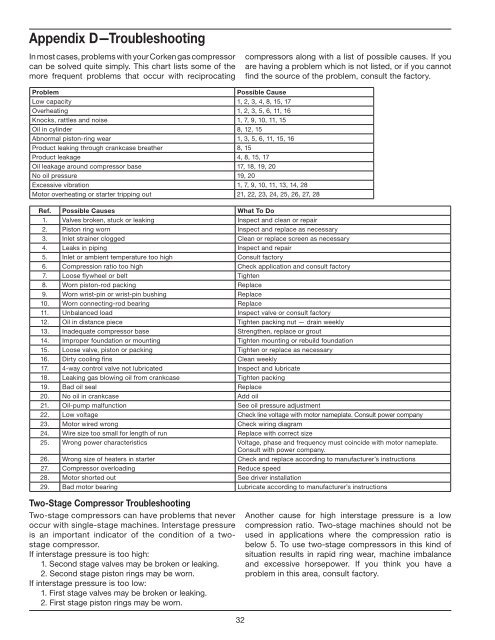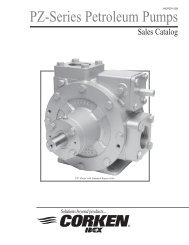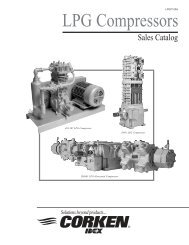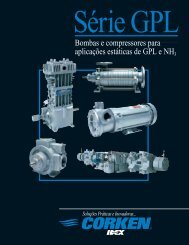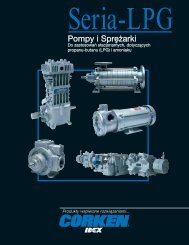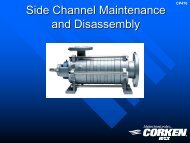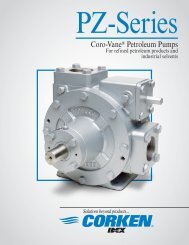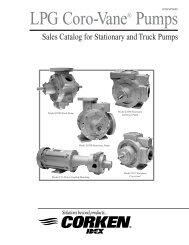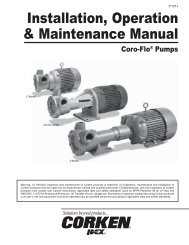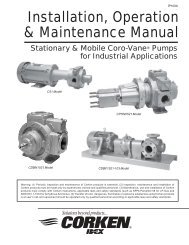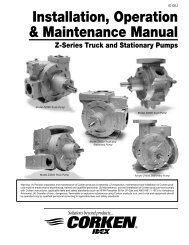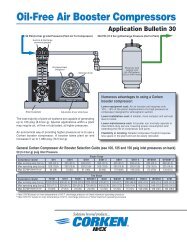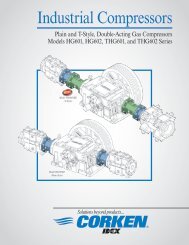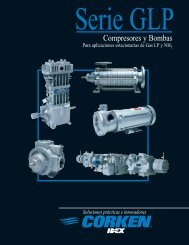Installation, Operation & Maintenance Manual - Corken
Installation, Operation & Maintenance Manual - Corken
Installation, Operation & Maintenance Manual - Corken
You also want an ePaper? Increase the reach of your titles
YUMPU automatically turns print PDFs into web optimized ePapers that Google loves.
Appendix D—Troubleshooting<br />
In most cases, problems with your <strong>Corken</strong> gas compressor<br />
can be solved quite simply. This chart lists some of the<br />
more frequent problems that occur with reciprocating<br />
compressors along with a list of possible causes. If you<br />
are having a problem which is not listed, or if you cannot<br />
find the source of the problem, consult the factory.<br />
Problem<br />
Possible Cause<br />
Low capacity 1, 2, 3, 4, 8, 15, 17<br />
Overheating 1, 2, 3, 5, 6, 11, 16<br />
Knocks, rattles and noise 1, 7, 9, 10, 11, 15<br />
Oil in cylinder 8, 12, 15<br />
Abnormal piston-ring wear 1, 3, 5, 6, 11, 15, 16<br />
Product leaking through crankcase breather 8, 15<br />
Product leakage 4, 8, 15, 17<br />
Oil leakage around compressor base 17, 18, 19, 20<br />
No oil pressure 19, 20<br />
Excessive vibration 1, 7, 9, 10, 11, 13, 14, 28<br />
Motor overheating or starter tripping out 21, 22, 23, 24, 25, 26, 27, 28<br />
Ref. Possible Causes What To Do<br />
1. Valves broken, stuck or leaking Inspect and clean or repair<br />
2. Piston ring worn Inspect and replace as necessary<br />
3. Inlet strainer clogged Clean or replace screen as necessary<br />
4. Leaks in piping Inspect and repair<br />
5. Inlet or ambient temperature too high Consult factory<br />
6. Compression ratio too high Check application and consult factory<br />
7. Loose flywheel or belt Tighten<br />
8. Worn piston-rod packing Replace<br />
9. Worn wrist-pin or wrist-pin bushing Replace<br />
10. Worn connecting-rod bearing Replace<br />
11. Unbalanced load Inspect valve or consult factory<br />
12. Oil in distance piece Tighten packing nut — drain weekly<br />
13. Inadequate compressor base Strengthen, replace or grout<br />
14. Improper foundation or mounting Tighten mounting or rebuild foundation<br />
15. Loose valve, piston or packing Tighten or replace as necessary<br />
16. Dirty cooling fins Clean weekly<br />
17. 4-way control valve not lubricated Inspect and lubricate<br />
18. Leaking gas blowing oil from crankcase Tighten packing<br />
19. Bad oil seal Replace<br />
20. No oil in crankcase Add oil<br />
21. Oil-pump malfunction See oil pressure adjustment<br />
22. Low voltage Check line voltage with motor nameplate. Consult power company<br />
23. Motor wired wrong Check wiring diagram<br />
24. Wire size too small for length of run Replace with correct size<br />
25. Wrong power characteristics Voltage, phase and frequency must coincide with motor nameplate.<br />
Consult with power company.<br />
26. Wrong size of heaters in starter Check and replace according to manufacturer’s instructions<br />
27. Compressor overloading Reduce speed<br />
28. Motor shorted out See driver installation<br />
29. Bad motor bearing Lubricate according to manufacturer’s instructions<br />
Two-Stage Compressor Troubleshooting<br />
Two-stage compressors can have problems that never<br />
occur with single-stage machines. Interstage pressure<br />
is an important indicator of the condition of a twostage<br />
compressor.<br />
If interstage pressure is too high:<br />
1. Second stage valves may be broken or leaking.<br />
2. Second stage piston rings may be worn.<br />
If interstage pressure is too low:<br />
1. First stage valves may be broken or leaking.<br />
2. First stage piston rings may be worn.<br />
Another cause for high interstage pressure is a low<br />
compression ratio. Two-stage machines should not be<br />
used in applications where the compression ratio is<br />
below 5. To use two-stage compressors in this kind of<br />
situation results in rapid ring wear, machine imbalance<br />
and excessive horsepower. If you think you have a<br />
problem in this area, consult factory.<br />
32


